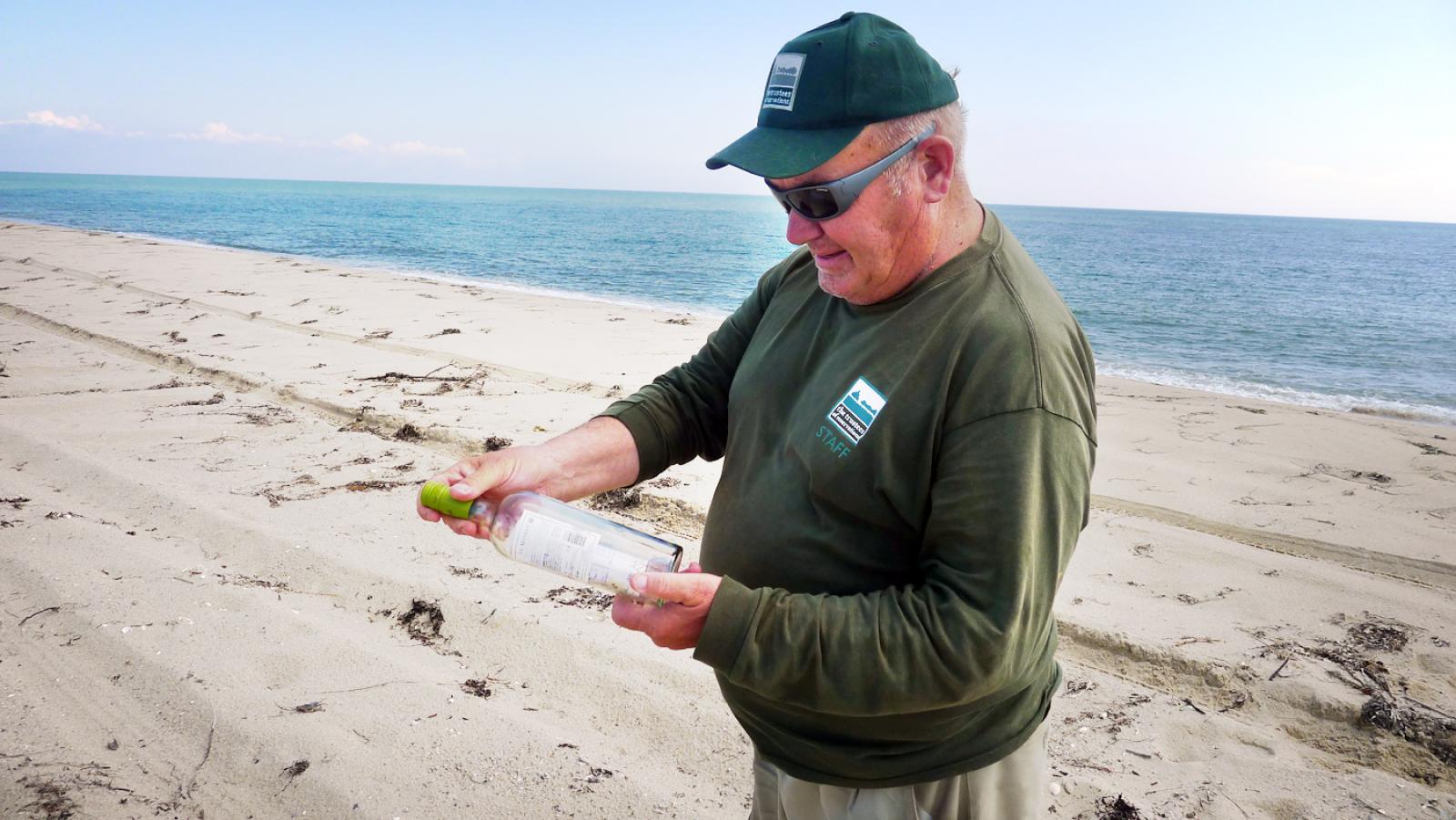As Paul Schultz drives up and down East Beach on Chappaquiddick, past picnicking families and fishermen lining the shore casting far into the riptides there, he finds a lot of stuff washed up on the beach. Most of it is trash — empty dish detergent bottles, balloons, an enormous amount of fish line tangled in great piles of seaweed and driftwood are all part of the flotsam and jetsam. Enough trash is found each year to fill three or four dumpsters, and that doesn’t include the wood that washes ashore. “Everything comes onto shore,” said Mr. Schultz, who is the assistant superintendent for The Trustees of Reservations and spends his days patrolling the many miles of beach that rim Chappaquiddick.
On a recent trip from Wasque to the Cape Pogue Light there was also a wine bottle containing a message.
But this too is not a rare find for Mr. Schultz, who through the years has found many bottles sealed with notes in them.
Between 40 and 50 such bottles wash up every year, he said. Often they come from the ferry, where it is apparently common practice for visitors leaving the Vineyard to throw their missives to the sea as the Island recedes behind them. When Mr. Schultz finds these bottles, he sometimes takes them out to Wasque if the tide and the wind are right, and hurls them out to sea where they might travel as far as Florida or Virginia. “Somebody can say, well look at this, it was sent off a boat going to Nantucket and now here it is in Key West or something,” he said.
If the bottle has traveled a long distance, Mr. Schultz will write back to the sender, but he rarely keeps what he finds. He did keep one touching note found two years ago by another employee of the Trustees. “To my daughter’s biological mother in China,” the note begins. “I’ll never know you. Never know what you look like or the sound of your voice. And yet you have given me one of the greatest gifts of my life, my beautiful daughter.” The note is undated. Mr. Schultz loves to share it with visitors and it looks well-handled.
His beach finds include other interesting things. He once found an old .22 caliber pistol with 100 rounds of ammunition housed in a first aid kit; a live World War II-era bomb is another discovery. The beach at Cape Pogue was used for military training exercises during World War II and ordnance is found there with some frequency. “The state police bomb squad came over and blew it up on the beach,” Mr. Schultz recalled of his found bomb. The Trustees warn visitors to be on the lookout for old ordnance.
Mr. Schultz is a fount of Chappaquiddick knowledge. As he drove along the beach track through areas with names like Drunkard’s Cove, Whistler Point and The Cedars, he talked about the changes he’s seen on the beach. “When I started, the beach was 900 feet out that way,” he said, pointing at the water off Wasque. The other major change has been the increasing number of off-road vehicles using the beach. “I did this [for] the first time in 1962, driving on the beach, and I’ve been doing it since then. I love it,” Mr. Schultz said. “We used to come out fishing, and in three or four days out here you might see two cars, but now you’ve got these fancy SUVs where a guy who’s a doctor or a lawyer can get a BMW or Mercedes or one of them that he can use for going to and from his office, but he can also go out on the beach.”
As the truck radio crackled intermittently with the voices of other Trustees employees, he pointed out the sights. Simple houses whose electricity comes exclusively from solar panels (there is no electric power at Cape Pogue and the handful of houses on the remote barrier beach are powered by gas or solar). An oystercatcher standing in the surf. The ruins of the old lighthouse, which has been moved seven times as the sea claimed the land in the face of constant erosion.
A veteran fisherman, Mr. Schultz has led surf casting expeditions for 14 years and said he prefers fishing from shore rather than from a boat. “It’s more fun off the beach, more of a challenge,” he said.
After a childhood spent moving around often because of his father’s job, Mr. Schultz settled on the Vineyard in high school. Except for a two-year stint in the Army in Viet Nam, Mr. Schultz has stayed on the Island. He applied for a summer position with the Trustees in 1991. “Hurricane Bob came through that year, August of 1991 and there was a lot of damage,” he recalled. And 20 years later he is still there.
“I enjoy it out here,” he said.




Comments
Comment policy »